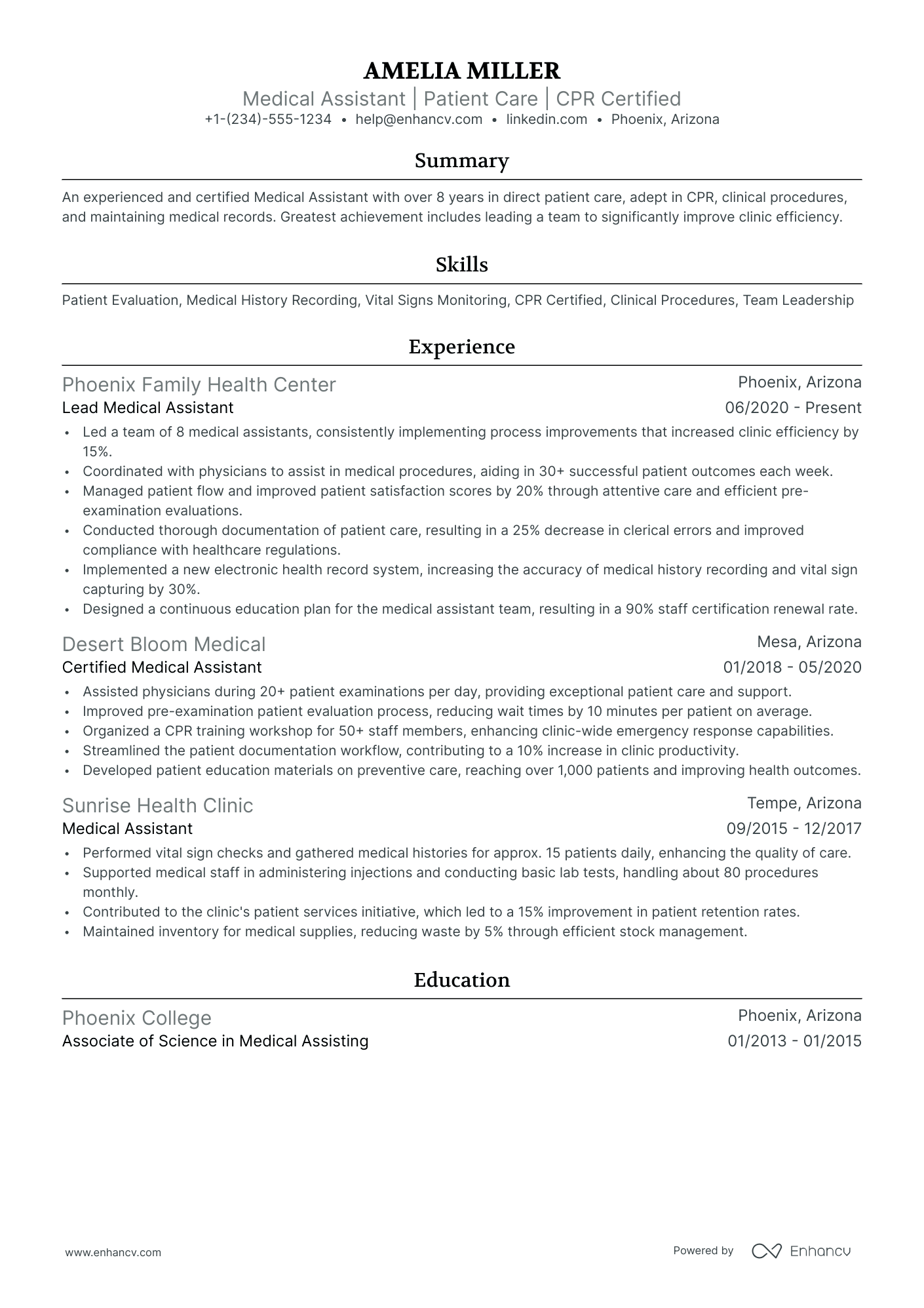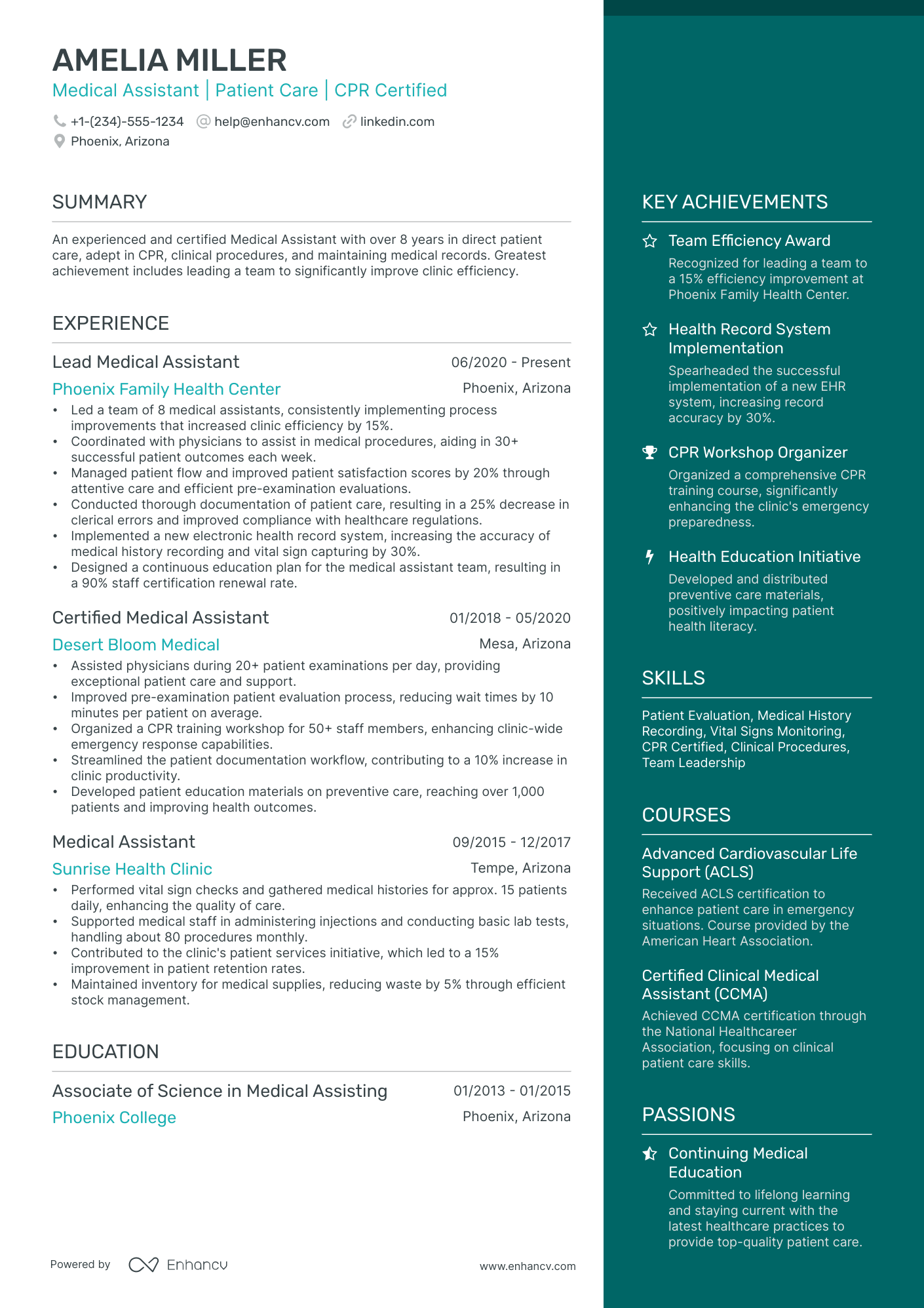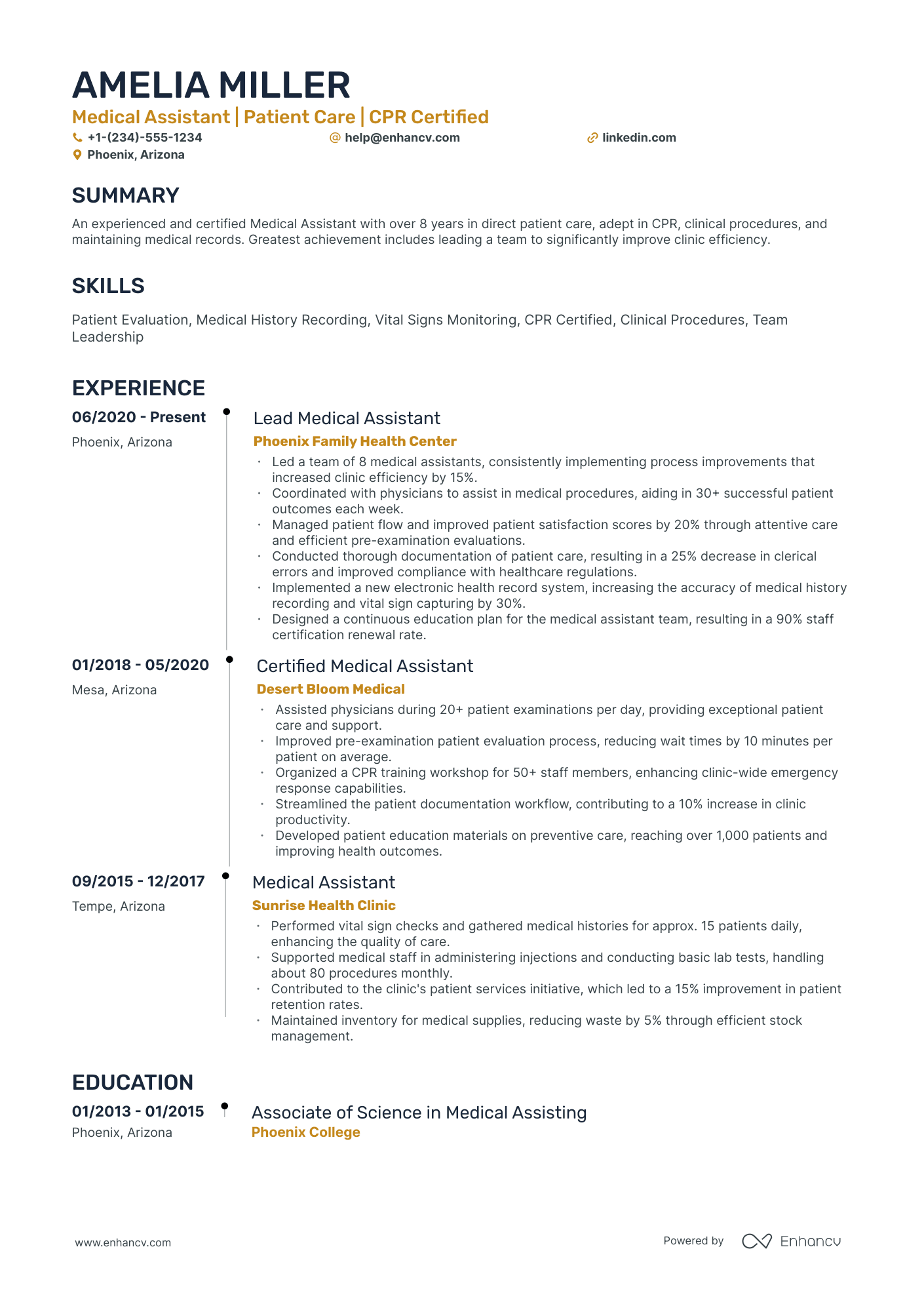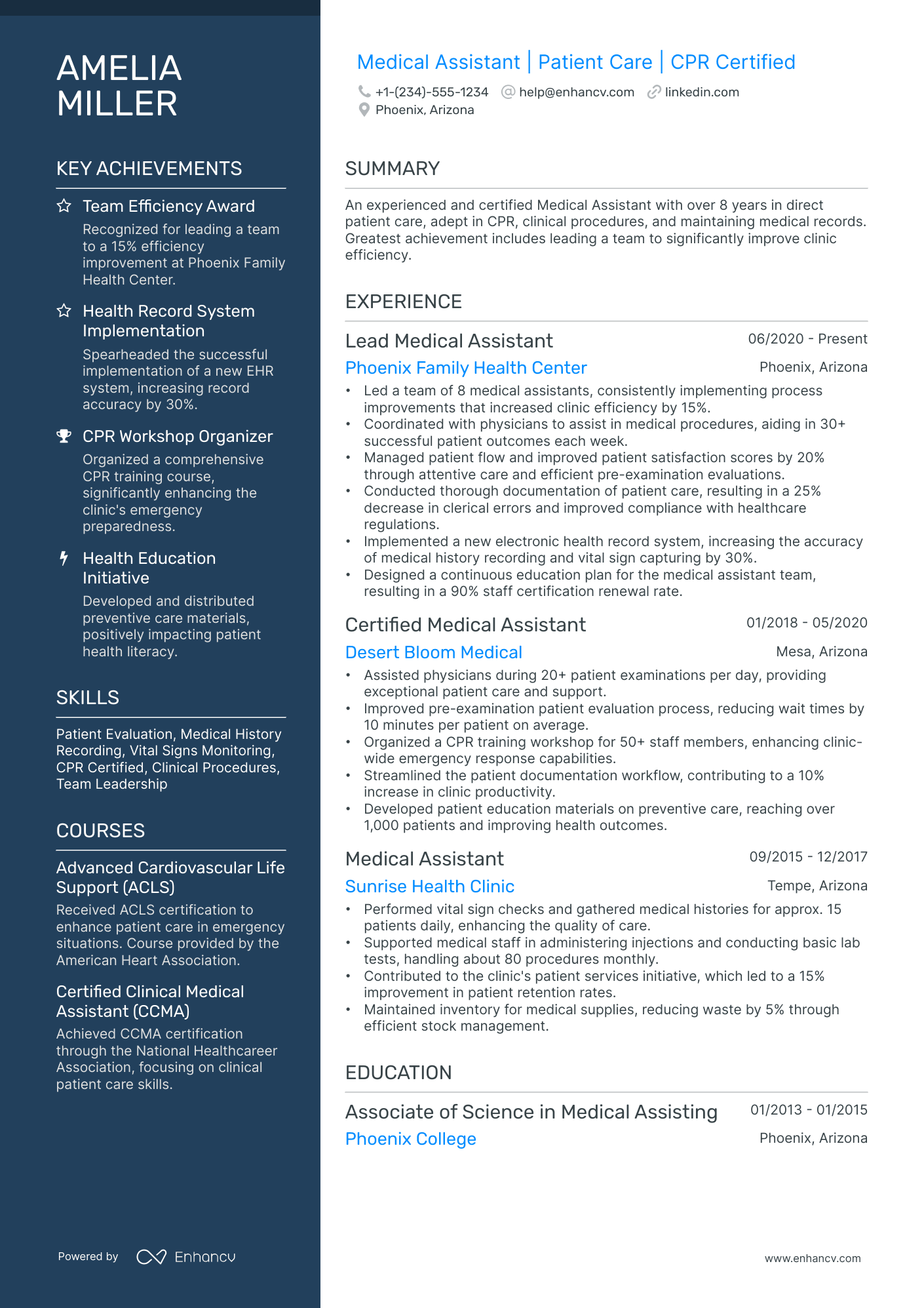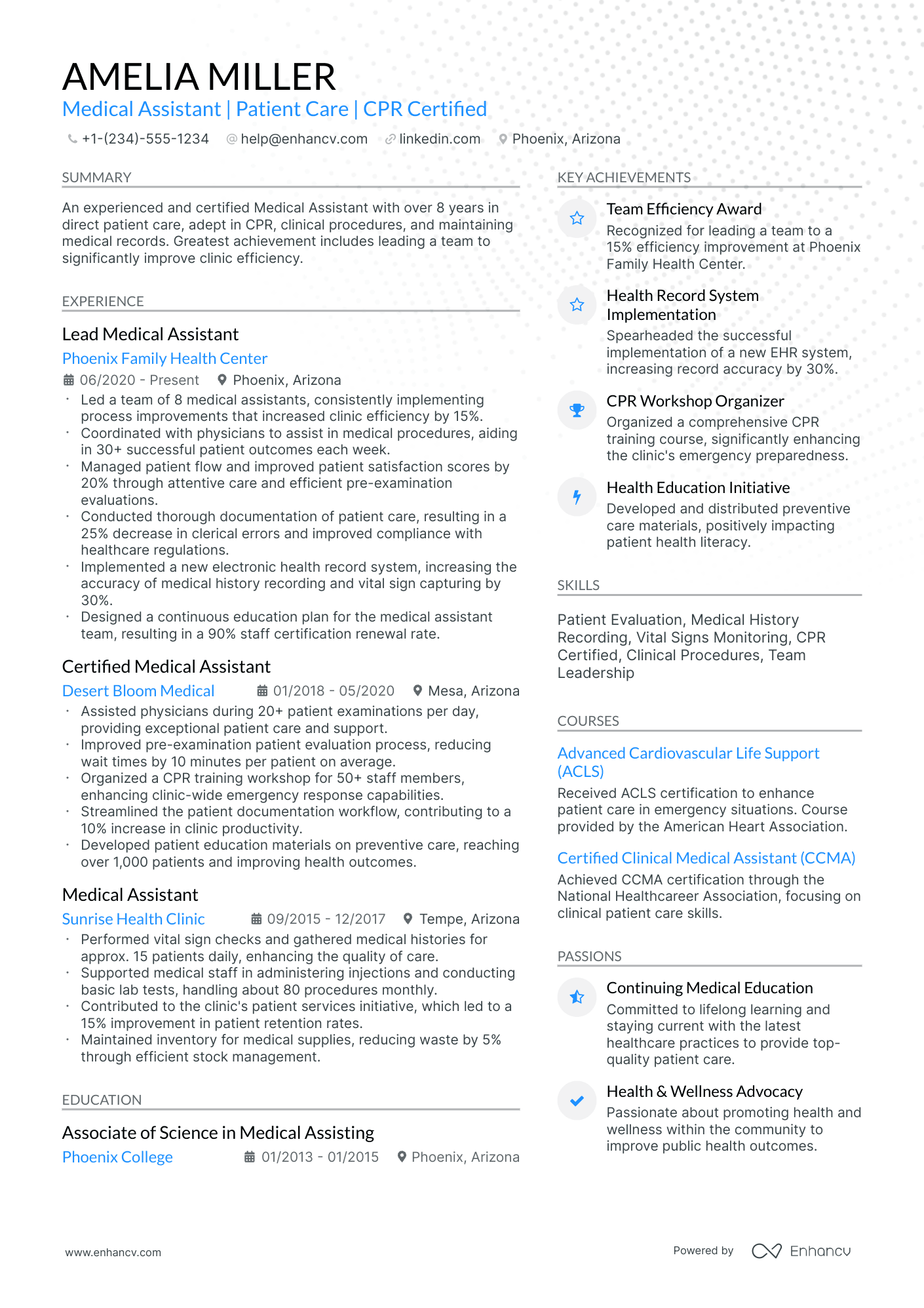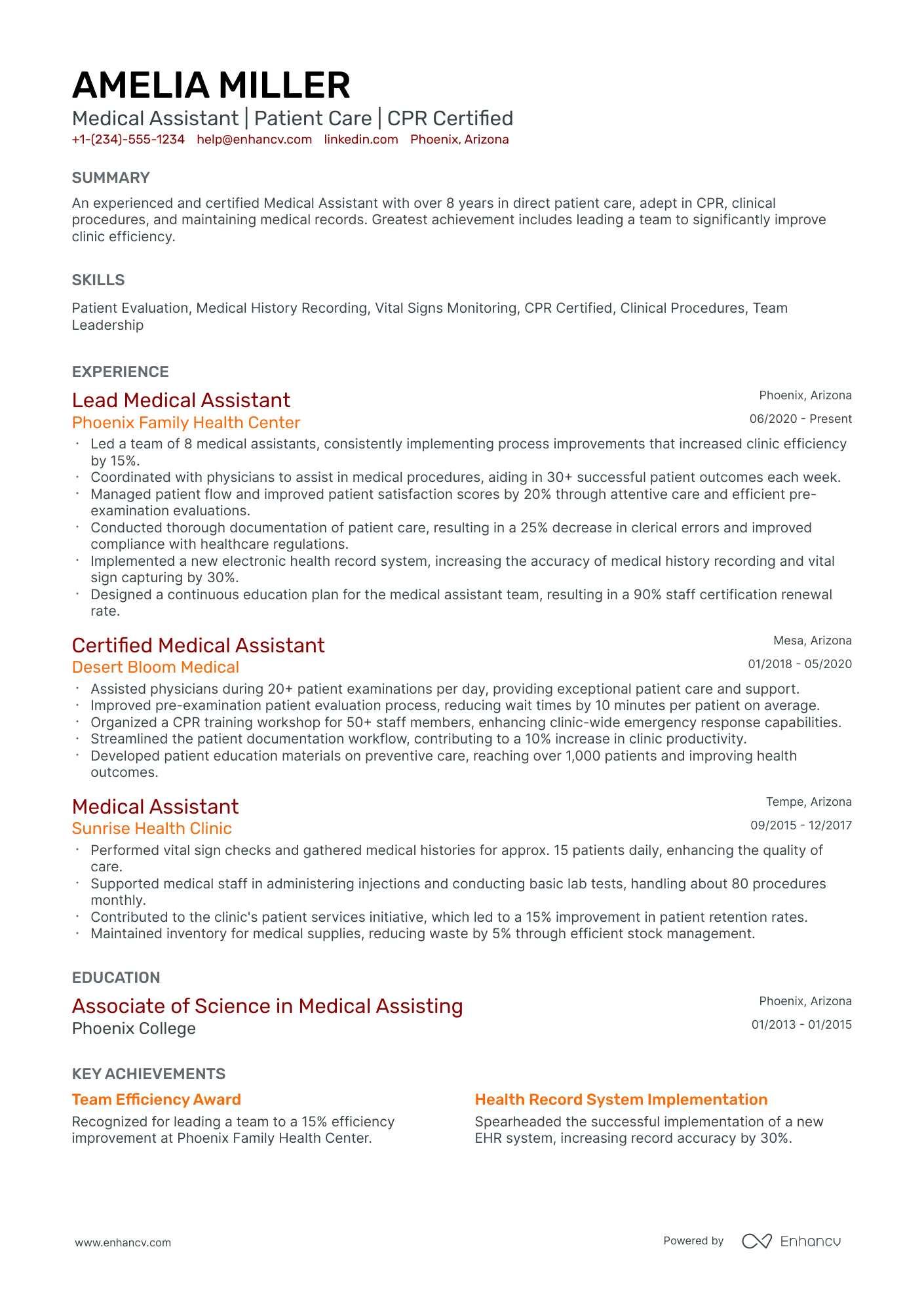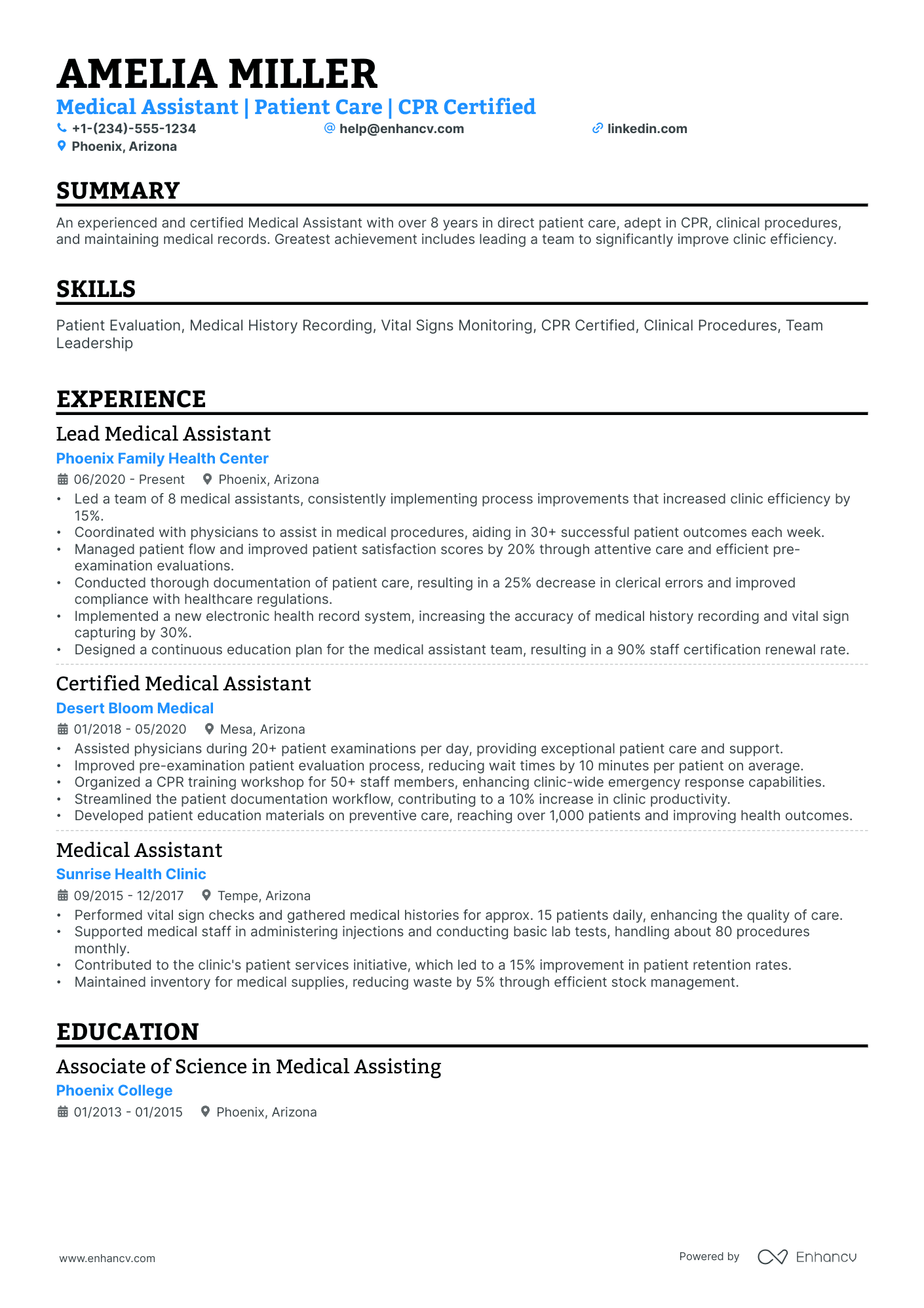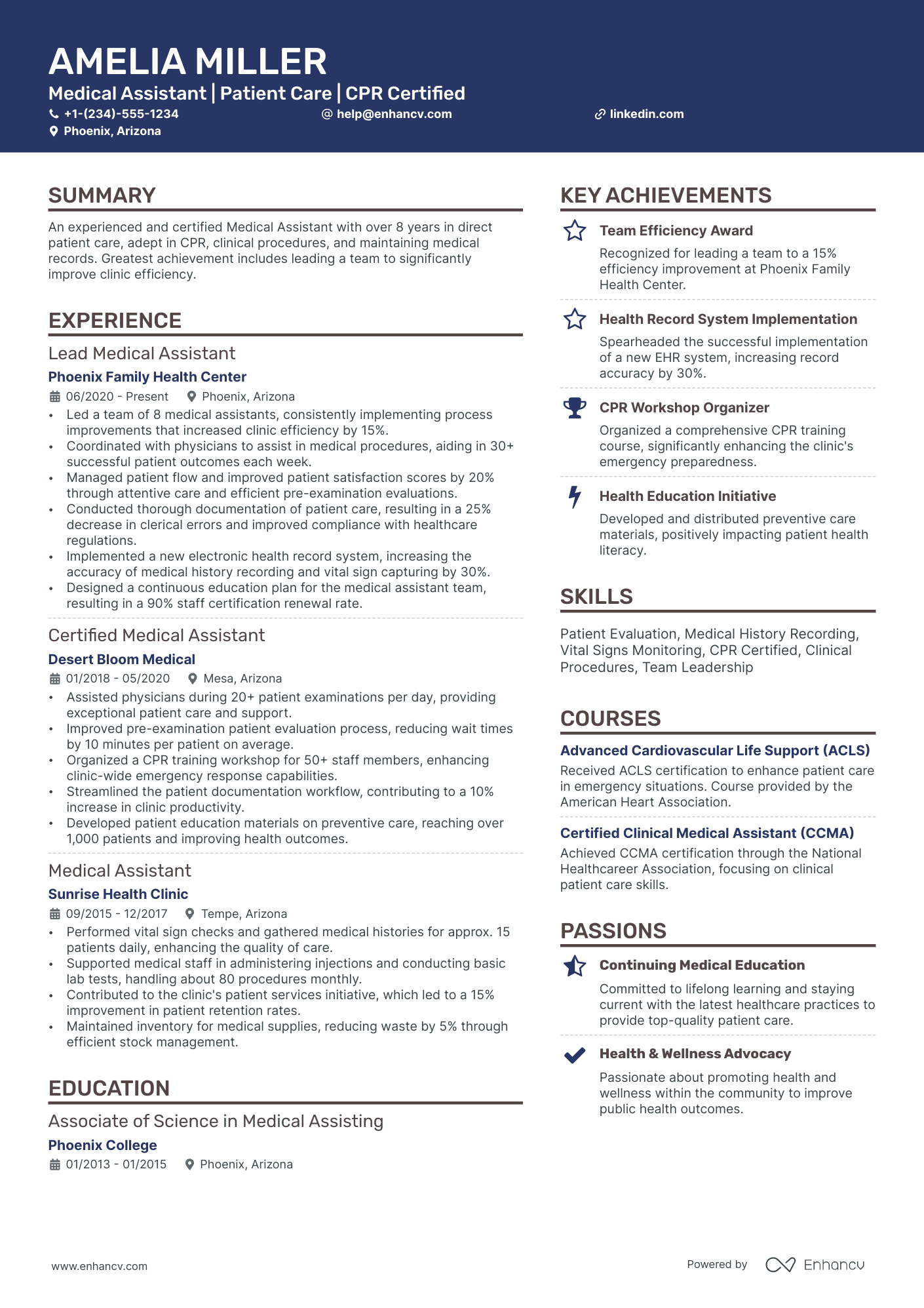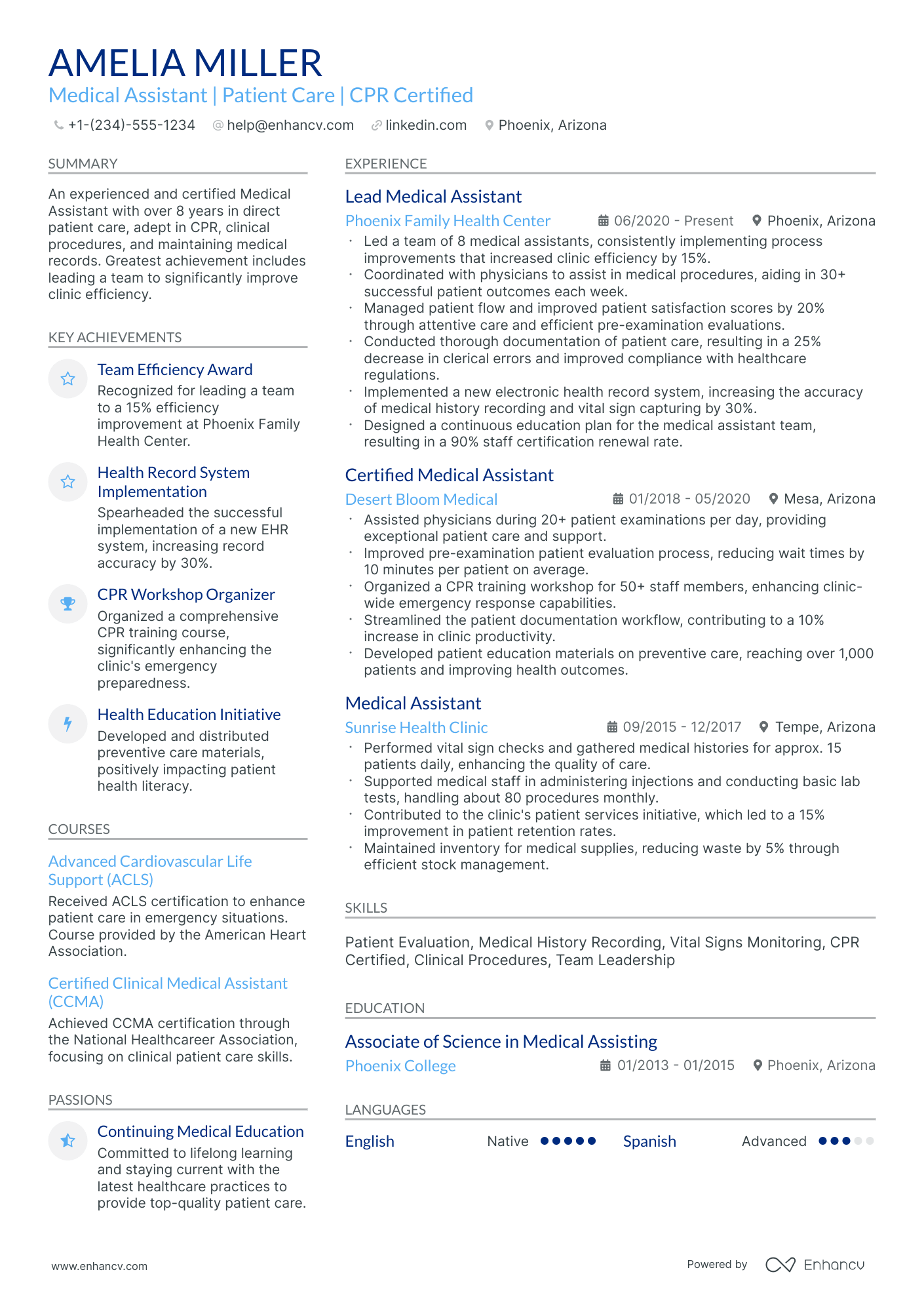As a clinical medical assistant, you may struggle with condensing diverse clinical tasks and patient interaction experience into a coherent and impactful resume. Our guide provides expert tips to help you highlight your clinical competencies and patient care skills, ensuring your resume stands out to potential employers.
- Find different clinical medical assistant resume examples to serve as inspiration to your professional presentation.
- How to use the summary or objective to highlight your career achievements.
- How to create the experience section to tell your story.
- Must have certificates and what to include in the education section of your resume.
If the clinical medical assistant resume isn't the right one for you, take a look at other related guides we have:
The importance of format and layout in your clinical medical assistant resume
Consider you're an HR professional at company X, evaluating two clinical medical assistant candidate resumes. John Smith presents a simple, traditional, and easy-to-read resume. Edward Price, however, uses a non-conventional, often illegible format. Whose resume would you spend more time on to understand their experience? This scenario underscores the importance of your clinical medical assistant resume’s design. It should be simply formatted and clearly communicate why you are the ideal candidate for the role.
Achieve this balance by:
- Listing your experience, beginning with the most recent and relevant, in reverse chronological order;
- Ensuring your header contains essential information, such as contact details, a headline, and a portfolio link. Include a professional photo in the clinical medical assistant resume header if you have one;
- Including only the most important and relevant resume sections to showcase your expertise and stand out from other candidates;
- Editing your clinical medical assistant resume to be no longer than two pages if you have extensive relevant experience. Use your limited resume space judiciously.
Also, remember that your clinical medical assistant resume might initially be scanned by an Applicant Tracker System (ATS).
When it comes to ATS:
- Opt for simple and legible fonts like Raleway, Rubik, Lato, etc., making your experience easy for the ATS to scan;
- Use serif and sans-serif fonts, both of which are ATS-friendly;
- Avoid overused options like Arial and Times New Roman, which, while suitable, may lack personality.
Contrary to a common myth, our recent study shows that the ATS can effectively process both one-column and two-column resumes. Learn more about this in the ATS myths guide.
Finally, when submitting your clinical medical assistant resume, always export it as a PDF to ensure all information remains intact, making the document easier to print, read, and scan.
Keep in mind market-specific formats – for example, a Canadian resume might follow a different structure.
Upload & Check Your Resume
Drop your resume here or choose a file. PDF & DOCX only. Max 2MB file size.
PRO TIP
List your educational qualifications and certifications in reverse chronological order.
Recruiters' preferred clinical medical assistant resume sections:
- A header with relevant contact information and headline, listing your current job title
- A resume summary or objective pinpointing what is most impressive about your expertise (that aligns with the role)
- An experience section highlighting the specifics of your responsibilities and achievements
- A skills sidebar to intertwine job advert keywords with your unique talents
- An education and certifications sections to serve as further accreditation to your professional experience
What recruiters want to see on your resume:
- Certification as a clinical medical assistant (e.g., CMA, RMA, NCMA).
- Hands-on experience with clinical procedures like phlebotomy, EKGs, and patient triage.
- Knowledge of medical terminology and patient charting.
- Proficiency in electronic health record (EHR) software and patient scheduling systems.
- Strong understanding of infection control and sterilization protocols.
Defining your professional expertise in your clinical medical assistant resume work experience section
The work experience section, often the most detailed part of your resume, is where you discuss your past roles and achievements. To effectively list your experience, consider these four key tips:
- Align your expertise with the job requirements. It's vital to integrate keywords matching the job criteria to pass initial assessments;
- Show, don’t just tell. Quantify your responsibilities by stating your actual achievements in previous roles;
- Include measurable metrics. For instance, how did your performance impact the annual ROI?
- Highlight crucial industry skills. Mention both technological knowledge and interpersonal skills in this section.
These guidelines will help you craft an impressive clinical medical assistant resume work experience section that is bound to catch recruiters' attention.
- Effectively managed a patient load of 30+ per day, ensuring accurate documentation and providing exceptional patient care at MedExpress Urgent Care.
- Facilitated a 15% increase in clinic efficiency by implementing a new electronic health record system and streamlining patient data entry processes.
- Successfully coordinated with a team of clinicians to administer vaccinations during the community flu season, contributing to a record number of 500+ vaccines administered.
- Orchestrated the implementation of patient-care procedures in collaboration with the healthcare team, enhancing patient satisfaction scores by 20% at Cleveland Clinic.
- Trained and mentored a team of 10 new clinical medical assistants, fostering a knowledgeable and efficient clinical support staff.
- Spearheaded a project to reorganize medical supplies inventory, reducing waste by 25% and saving the clinic $15,000 annually in unnecessary costs.
- Performed 50+ routine and specialized medical procedures per month, consistently receiving commendations for precision and patient care at Kaiser Permanente.
- Played a key role in the clinic achieving a 95% patient satisfaction rating by delivering compassionate care and efficient service.
- Collaborated with healthcare providers to develop patient education materials, enhancing comprehension and compliance with treatment plans.
- Administered daily patient assessments, vitals and injections for 20+ patients, receiving a 98% accuracy rate in clinical tasks at Banner Health.
- Participated in weekly interdisciplinary team meetings to discuss patient care plans, helping to reduce hospital readmission rates by 10%.
- Optimized appointment scheduling procedures, resulting in a 30% reduction in patient wait times and an increase in patient throughput.
- Performed phlebotomy on approximately 15 patients per day with a 99% first-stick accuracy at Mayo Clinic.
- Assisted with the integration of a new patient tracking software, which increased the facility’s operational efficiency by 18%.
- Regularly assisted in minor surgical procedures, providing reliable support and maintaining a sterile environment at all times.
- Accurately recorded patient histories and symptoms for 25+ patients daily, playing a vital role in the diagnosis process at Johns Hopkins Medicine.
- Developed and conducted weekly health education sessions for patients, leading to an improved understanding of chronic disease management.
- Coordinated external patient referrals and follow-up care, which enhanced the continuity of care for patients with complex needs.
- Maintained a high standard of patient care for up to 40 patients per shift in a high-volume outpatient setting at Mount Sinai Hospital.
- Contributed to the improvement of the patient triage system, reducing average triage time by 15 minutes.
- Demonstrated exceptional ability to handle medical emergencies, providing timely and effective support during several critical incidents.
- Streamlined patient registration and intake process, allowing for a 35% improvement in patient processing time at Stanford Health Care.
- Implemented a comprehensive patient follow-up protocol that increased the rate of return appointments by 40%, ensuring better patient care continuity.
- Conducted 60+ EKGs per week with a 100% accuracy rate, being recognized for outstanding performance by the Cardiology department.
The following content includes information from "O*NET OnLine" by the U.S. Department of Labor, Employment and Training Administration (USDOL/ETA). Used under the CC BY 4.0 license. The data represents the top responsibilities present on the task lists for clinical medical assistant professionals.
Top Responsibilities for Clinical Medical Assistant:
- Interview patients to obtain medical information and measure their vital signs, weight, and height.
- Clean and sterilize instruments and dispose of contaminated supplies.
- Record patients' medical history, vital statistics, or information such as test results in medical records.
- Explain treatment procedures, medications, diets, or physicians' instructions to patients.
- Prepare treatment rooms for patient examinations, keeping the rooms neat and clean.
- Collect blood, tissue, or other laboratory specimens, log the specimens, and prepare them for testing.
- Help physicians examine and treat patients, handing them instruments or materials or performing such tasks as giving injections or removing sutures.
- Perform routine laboratory tests and sample analyses.
- Perform general office duties, such as answering telephones, taking dictation, or completing insurance forms.
- Prepare and administer medications as directed by a physician.
Quantifying impact on your resume
- Report the number of patients assisted on an average day to demonstrate throughput and efficiency.
- Include the percentage by which you helped reduce patient wait time by streamlining administrative processes.
- Mention the volume of clinical inventory managed to showcase organizational and inventory management skills.
- State the number of medical procedures you've been involved with to highlight direct clinical experience.
- Document any quantifiable improvements you contributed to in patient satisfaction scores.
- Detail the number of medical records you handle or process daily to indicate familiarity with data management.
- Present the number of healthcare software platforms you are proficient in to exhibit technical skills.
- Quantify the amount of training sessions or workshops you have conducted to reflect leadership and knowledge-sharing abilities.
Action verbs for your clinical medical assistant resume
What can candidates do about their resume, if they have no experience
Job requirements can sometimes be answered by other elements you could make more prominent in your clinical medical assistant resume.
Thus, you'd be substituting your lack of experience with your relevant:
- Education with details of skills you've obtained that align with the job
- Internships and short-term jobs that are once more dedicated to putting your expertise in the spotlight
- Skills section answering basic and - potentially - more specific job qualifications
- Strengths or accomplishments to show the unique value you present, even as a candidate with less or no professional experience in the industry.
Recommended reads:
PRO TIP
Highlight any significant extracurricular activities that demonstrate valuable skills or leadership.
In-demand hard skills and soft skills for your clinical medical assistant resume
A vital element for any clinical medical assistant resume is the presentation of your skill set.
Recruiters always take the time to assess your:
- Technological proficiency or hard skills - which software and technologies can you use and at what level?
- People/personal or soft skills - how apt are you at communicating your ideas across effectively? Are you resilient to change?
The ideal candidate presents the perfect balance of hard skills and soft skills all through the resume, but more particular within a dedicated skills section.
Building your clinical medical assistant skills section, you should:
- List up to six skills that answer the requirements and are unique to your expertise.
- Include a soft skill (or two) that defines you as a person and professional - perhaps looking back on feedback you've received from previous managers, etc.
- Create up to two skills sections that are organized based on the types of skills you list (e.g. "technical skills", "soft skills", "clinical medical assistant skills", etc.).
- If you happen to have technical certifications that are vital to the industry and really impressive, include their names within your skills section.
At times, it really is frustrating to think back on all the skills you possess and discover the best way to communicate them across.
We understand this challenge - that's why we've prepared two lists (of hard skills and soft skills) to help you build your next resume, quicker and more efficiently:
Top skills for your clinical medical assistant resume:
Electronic Health Records (EHR) Management
Medical Terminology
Phlebotomy
Vital Signs Monitoring
Injections and Immunizations
Patient Scheduling Software
Clinical Lab Equipment Operation
Medical Coding and Billing
Diagnostic Testing
Infection Control Procedures
Communication Skills
Empathy
Attention to Detail
Time Management
Problem Solving
Team Collaboration
Adaptability
Organization
Patient Advocacy
Conflict Resolution
Next, you will find information on the top technologies for clinical medical assistant professonals from "O*NET OnLine" by the U.S. Department of Labor, Employment and Training Administration (USDOL/ETA). Used under the CC BY 4.0 license.
Top technologies for Clinical Medical Assistant’s resume:
- eClinicalWorks EHR software
- Epic Systems
- Microsoft PowerPoint
- Email software
- Microsoft Outlook
PRO TIP
Always remember that your clinical medical assistant certifications can be quantified across different resume sections, like your experience, summary, or objective. For example, you could include concise details within the expertise bullets of how the specific certificate has improved your on-the-job performance.
The importance of your certifications and education on your clinical medical assistant resume
Pay attention to the resume education section . It can offer clues about your skills and experiences that align with the job.
- List only tertiary education details, including the institution and dates.
- Mention your expected graduation date if you're currently studying.
- Exclude degrees unrelated to the job or field.
- Describe your education if it allows you to highlight your achievements further.
Your professional qualifications: certificates and education play a crucial role in your clinical medical assistant application. They showcase your dedication to gaining the best expertise and know-how in the field. Include any diplomas and certificates that are:
- Listed within the job requirements or could make your application stand out
- Niche to your industry and require plenty of effort to obtain
- Helping you prepare for professional growth with forward-facing know-how
- Relevant to the clinical medical assistant job - make sure to include the name of the certificate, institution you've obtained it at, and dates
Both your certificates and education section need to add further value to your application. That's why we've dedicated this next list just for you - check out some of the most popular clinical medical assistant certificates to include on your resume:
The top 5 certifications for your clinical medical assistant resume:
- Certified clinical medical assistant (CCMA) - National Healthcareer Association (NHA)
- Certified Medical Assistant (CMA) - American Association of Medical Assistants (AAMA)
- Registered Medical Assistant (RMA) - American Medical Technologists (AMT)
- Nationally Registered Certified Medical Assistant (NRCMA) - National Association for Health Professionals (NAHP)
- Certified Medical Administrative Assistant (CMAA) - National Healthcareer Association (NHA)
The content below includes information from "O*NET OnLine" by the U.S. Department of Labor, Employment and Training Administration (USDOL/ETA). Used under the CC BY 4.0 license. The data represents the top associations for clinical medical assistant professionals.
Top US associations for a Clinical Medical Assistant professional
- Accrediting Bureau of Health Education Schools
- American Association of Medical Assistants
- American Heart Association
- American Medical Technologists
- American Optometric Association
PRO TIP
The more time and effort you've put into obtaining the relevant certificate, the closer to the top it should be listed. This is especially important for more senior roles and if the company you're applying for is more forward-facing.
Recommended reads:
Adding a summary or objective to your clinical medical assistant resume
One of the most crucial elements of your professional presentation is your resume's top one-third. This most often includes:
- Either a resume summary - your career highlights at a glance. Select the summary if you have plenty of relevant experience (and achievements), you'd like recruiters to remember about your application.
- Or, a resume objective - to showcase your determination for growth. The perfect choice for candidates with less experience, who are looking to grow their career in the field.
If you want to go above and beyond with your clinical medical assistant resume summary or resume objective, make sure to answer precisely why recruiters need to hire you. What is the additional value you'd provide to the company or organization? Now here are examples from real-life clinical medical assistant professionals, whose resumes have helped them land their dream jobs:
Resume summaries for a clinical medical assistant job
- Dedicated clinical medical assistant with over 7 years of experience in fast-paced medical offices, adept at performing patient intake, preparing exam rooms, and assisting with minor surgical procedures. Exceptional understanding of patient care protocols and expertise in EHR software, culminating in recognition for increasing clinic operational efficiency by 15%.
- Detail-oriented professional transitioning from a 5-year career in medical laboratory technology to Clinical Medical Assistance. Excels in accurate data collection, patient interaction, and adhering to health standards, seeking to leverage skills in a dynamic clinical setting and contribute to patient care excellence.
- Licensed Practical Nurse with 6 years of experience transitioning into Clinical Medical Assistance, bringing a deep knowledge of nursing care principles, robust patient education techniques, and the successful management of a 20-bed patient ward, eager to apply clinical skills in a hands-on patient support role.
- As a recent graduate from a reputable Medical Assistant certificate program, I am eager to apply comprehensive training in patient care, medical terminology, and phlebotomy techniques. My objective is to catalyze my passion for healthcare into delivering high-quality assistance and uphold patient satisfaction standards.
- Early-career enthusiast with a fresh perspective, seeking to start a career in Clinical Medical Assistance. Eager to utilize my academic knowledge gained from an accredited Medical Assistant program and demonstrate my excellent communication skills, profound commitment to patient care, and proactive learning attitude in a thriving clinical environment.
Optimize your resume summary and objective for ATS
Drop your resume here or choose a file.
PDF & DOCX only. Max 2MB file size.
Average salary info by state in the US for clinical medical assistant professionals
Local salary info for Clinical Medical Assistant.” Source: My Next Move, National Center for O*NET Development. Accessed 10/15/2024
| State | Average Salary (in USD) |
|---|---|
| US National Average | $42,000 |
| California (CA) | $46,690 |
| Texas (TX) | $37,570 |
| Florida (FL) | $38,340 |
| New York (NY) | $45,440 |
| Pennsylvania (PA) | $39,480 |
| Illinois (IL) | $42,850 |
| Ohio (OH) | $38,280 |
| Georgia (GA) | $38,060 |
| North Carolina (NC) | $40,190 |
| Michigan (MI) | $38,300 |
Other clinical medical assistant resume sections to support your expertise and skills
Recruiters are always on the lookout for that clinical medical assistant candidate who brings about even more value to the role.
This can be either via their personality or additional accreditations they have across the industry.
Add to your resume any of the four sections that fit your profile:
- Projects for your most impressive, cutting-edge work;
- Awards or recognitions that matter the most;
- Publications further building up your professional portfolio and accreditations;
- Hobbies and interests to feature the literature you read, how you spend your time outside of work, and other personality traits you deem may help you stand out .
Key takeaways
- Pay special attention to the tiny details that make up your clinical medical assistant resume formatting: the more tailored your application to the role is, the better your chances at success would be;
- Select the sections you include (summary or objective, etc.) and formatting (reverse-chronological, hybrid, etc.) based on your experience level;
- Select experience items and, consequently, achievements that showcase you in the best light and are relevant to the job;
- Your profile will be assessed both based on your technical capabilities and personality skills - curate those through your resume;
- Certifications and education showcase your dedication to the particular industry.
